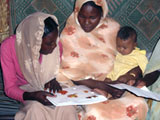
IMCI in Sudan is moving forward with its community component interventions to promote selected key family practices on child care. The main focus is on the use of community health promoters (CHPs), a cadre of volunteers based in the community. Covering 10-15 households each, a CHP usually visits each household one to two times a month. She is expected to make an assessment of the key child care family practices for that household first. If any child below five years of age is ill in the household (e.g. with fever, cough or difficult breathing, diarrhoea, etc.), the CHP focuses her advice to the mother on whether to take the child to the health facility―if any of the signs for care-seeking is present―and what home care to provide. If no child is ill, the CHP delivers messages related to one of the selected key family practices, changing family practice as a topic next visit. CHPs also hold health education sessions in the community. Trained core teams have been established in the states to decentralize the intervention. To date, the intervention has been introduced in 126 communities , with 2418 CHPs trained. Partnerships have been established with some community-based organizations to accelerate the pace of expansion. Revised approaches have been proposed to address such key issues as sustainability―related to the high drop out rates of the volunteers, CHP motivation, community ownership, improving household visit procedures and expanding the scope of CHPs to make the intervention more effective. Another community intervention, started in July 2009, is targeting basic school teachers and their pupils as promoting agents in their own communities. The introduction of IMCI into the pre-service teaching programmes of community medicine in medical schools in Sudan is another effort to produce community-oriented doctors with good counselling skills to further promote key family practices.





 IMCI pre-service education: guide to evaluation
IMCI pre-service education: guide to evaluation